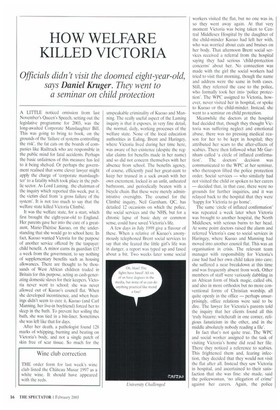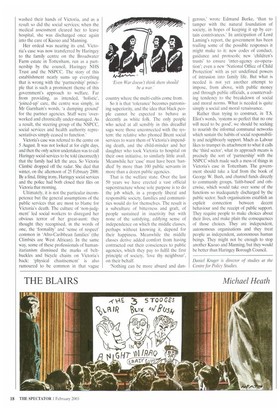HOW WELFARE KILLED VICTORIA
Officials didn't visit the doomed eight-year-old,
says Daniel Kruger. They went to
a seminar on child protection
A LITTLE noticed omission from last November's Queen's Speech, setting out the legislative programme for 2003, was the long-awaited Corporate Manslaughter Bill. This was going to bring to book, on the grounds of the 'failure of systems controlling the risk', the fat cats on the boards of companies like Railtrack who are responsible in the public mind for fatal accidents. Perhaps the basic unfairness of this measure has led to it being shelved. Or perhaps the government realised that some clever lawyer might apply the charge of 'corporate manslaughter' to a fatality which took place in the public sector. As Lord Laming, the chairman of the inquiry which reported this week, put it, the victim died from 'a gross failure of the system'. It is not too much to say that the welfare state killed Victoria Climbie.
It was the welfare state, for a start, which first brought the eight-year-old to England. Her parents gave her into the care of a greataunt, Marie-Therese Kuoao, on the understanding that she would go to school here. In fact, Kuoao wanted Victoria for the purpose of another service offered by the taxpayer: child benefit. A minor earns its guardian £15 a week from the government, to say nothing of supplementary benefits such as housing allowances. There are thought to be thousands of West African children traded in Britain for this purpose, acting as cash-generating domestic slaves for their keepers. Victoria never went to school; she was never allowed out of Kuoao's council flat. When she developed incontinence, and when beatings didn't seem to cure it. Kuoao (and Carl Manning, her live-in boyfriend) forced her to sleep in the bath. To prevent her soiling the bath, she was tied in a bin-liner. Sometimes she was left like that for days.
After her death, a pathologist found 128 marks of whipping, burning and beating on Victoria's body, and not a single patch of skin free of scar tissue. So much for the unspeakable criminality of Kuoao and Manning. The really useful aspect of the Laming inquiry is that it exposes, in very fine detail, the normal, daily, working processes of the welfare state. None of the local education authorities in Ealing, Brent and Haringey, where Victoria lived during her time here, was aware of her existence (despite the regular claims for benefits made in her name) and so did not concern themselves with her absence from school. The benefits agency, of course, efficiently paid her great-aunt to keep her trussed in a sack awash with her own excrement, locked in an unlit, unheated bathroom, and periodically beaten with a bicycle chain. But these were merely administrative oversights. The counsel for the Climbie inquiry, Neil Garnham, QC, has detailed 12 occasions on which the police, the social services and the NHS, but for a chronic lapse of basic duty or common sense, could have saved Victoria's life.
A few days in July 1999 give a flavour of these. When a relative of Kuoao's anonymously telephoned Brent social services to say that she feared the little girl's life was in danger, a report was typed up and faxed about a bit. Two weeks later some social workers visited the flat, but no one was in, so they went away again. At that very moment Victoria was being taken to Central Middlesex Hospital by the daughter of the child-minder Kuoao had left her with, who was worried about cuts and bruises on her body. That afternoon Brent social services received a referral from the hospital saying they had serious 'child-protection concerns' about her. No connection was made with the girl the social workers had tried to visit that morning, though the name and address were the same in both cases. Still, they referred the case to the police, who formally took her into 'police protection'. The WPC assigned to Victoria, however, never visited her in hospital, or spoke to Kuoao or the child-minder. Instead, she went to a seminar on child protection.
Meanwhile the doctors at the hospital had decided that, though they thought Victoria was suffering neglect and emotional abuse, there was no pressing medical reason for her to be kept in hospital; they attributed her scars to the after-effects of scabies. There then followed what Mr Garnham called 'a circle of inflated confirmation'. The doctors' decision was communicated to the WPC at her seminar, who thereupon lifted the police protection order. Social services — who similarly had not visited the child or spoken to her carers — decided that, in that case, there were no grounds for further inquiries, and it was relayed back to the hospital that they were 'happy for Victoria to go home'.
The same 'circle of inflated confirmation' was repeated a week later when Victoria was brought to another hospital, the North Middlesex, with serious burns to her head. At some point doctors raised the alarm and referred Victoria's case to social services in Haringey, where Kuoao and Manning had moved into another council flat. This was an organisation in crisis. The relevant team manager with responsibility for Victoria's case had had her own child taken into care: she suffered a near breakdown at this time and was frequently absent from work. Other members of staff were variously dabbling in an African form of black magic, called obi, and also in more orthodox but no more conventional forms of Christian worship, all quite openly in the office — perhaps unsurprisingly, office relations were said to be dire. The lawyer for Victoria's parents told the inquiry that her clients found all this 'truly bizarre: witchcraft in one corner, religious fanaticism in the other, and in the middle absolutely nobody reading a file'.
In fact that's not quite true. The WPC and social worker assigned to the task of visiting Victoria's home did read her file. There they noticed a reference to scabies. This frightened them and, fearing infection, they decided that they would not visit the flat after all. Instead they saw Victoria in hospital, and ascertained to their satisfaction that she was fine: she made, said the policewoman, `no allegation of crime' against her carers. Again, the police washed their hands of Victoria, and as a result so did the social services; when the medical assessment cleared her to leave hospital, she was discharged once again into the care of Kuoao and Manning.
Her ordeal was nearing its end. Victoria's case was now transferred by Haringey to the family centre on the Broadwater Farm estate in Tottenham, run as a partnership by the council, Haringey NHS Trust and the NSPCC. The story of this establishment neatly sums up everything that is wrong with the 'partnership' principle that is such a prominent theme of this government's approach to welfare. Far from providing, as intended, 'holistic', `joined-up' care, the centre was simply, in Mr Garnham's words, 'a dumping ground' for the partner agencies. Staff were 'overworked and chronically under-managed. As a result, the steering group of the NSPCC, social services and health authority representatives simply ceased to function.'
Victoria's case was referred to the centre on 5 August. It was not looked at for eight days, and then the only action undertaken was to call Haringey social services to be told (incorrectly) that the family had left the area. So Victoria Climbie dropped off the radar. She died that winter, on the afternoon of 25 February 2000. By a final, fitting irony, Haringey social services and the police had both closed their files on Victoria that morning.
Ultimately, it is not the particular incompetence but the general assumptions of the public services that are most to blame for Victoria's death. The culture of non-judgment' led social workers to disregard her obvious terror of her great-aunt: they thought they recognised, in the words of one, the 'formality' and 'sense of respect' common in 'Afro-Caribbean families' (the Climbies are West African). In the same way, some of these professionals of humanitarianism dismissed the marks of beltbuckles and bicycle chains on Victoria's back: 'physical chastisement' is also rumoured to be common in that vague country where the multi-cultis come from.
So it is that 'tolerance' becomes patronising superiority, and the idea that black people cannot be expected to behave as decently as white folk. The only people who acted at all sensibly in this dreadful saga were those unconnected with the system: the relative who phoned Brent social services to warn them of Victoria's impending death, and the child-minder and her daughter who took Victoria to hospital on their own initiative, to similarly little avail. Meanwhile her 'case' must have been 'handled' by more than 100 public servants in more than a dozen public agencies.
That is the welfare state. Over the last 50 years we have erected a vast official superstructure whose sole purpose is to do the job which, in a properly liberal and responsible society, families and communities would do for themselves. The result is a subculture of bitterness and graft, of people sustained in inactivity but with none of the satisfying, edifying sense of independence on which the middle classes, perhaps without knowing it, depend for their happiness. Meanwhile the middle classes derive added comfort from having contracted out their consciences to public agencies, which they pay to fulfil the first principle of society, 'love thy neighbour', on their behalf.
'Nothing can be more absurd and dan gerous,' wrote Edmund Burke, 'than to tamper with the natural foundation of society, in hopes of keeping it up by certain contrivances.' In anticipation of Lord Laming's report, the government has been trailing some of the possible responses it might make to it: new codes of conduct, guidance and protocols; new 'children's trusts' to ensure 'inter-agency co-operation'; even a new 'National Office of Child Protection' with as yet undefined powers of intrusion into family life, But what is needed is not yet another attempt to impose, from above, with public money and through public officials, a countervailing tendency to the breakdown of social and moral norms. What is needed is quite simply a social and moral renaissance.
Rather than Hying to construct, in T.S. Eliot's words, 'systems so perfect that no one will need to be good', we should be seeking to nourish the informal communal networks which sustain the habits of social responsibility and neighbourly support. Much as Labour likes to trumpet its attachment to what it calls the 'third sector', what its approach means is precisely the sort of 'partnership' with the NSPCC which made such a mess of things in Victoria's case in Tottenham. The government should take a leaf from the book of George W. Bush, and channel funds directly to community groups, 'faith-based' and otherwise, which would take over some of the functions so inadequately discharged by the public sector. Such organisations establish an explicit connection between decent behaviour and the receipt of public support. They require people to make choices about their lives, and make plain the consequences of those choices. They are independent, autonomous organisations and they treat people as independent, autonomous human beings. They might not be enough to stop another Kuoao and Manning, but they would be better than Haringey Borough Council.
Daniel Kruger is director of studies at the Centre for Policy Studies.



























































 Previous page
Previous page